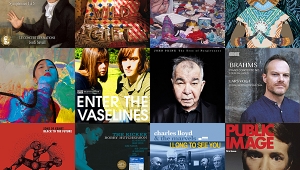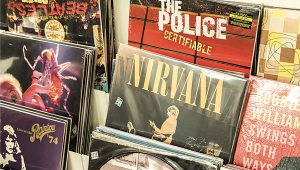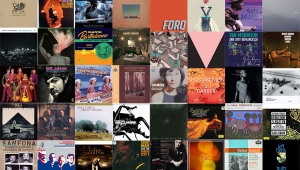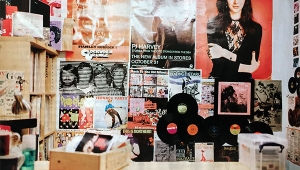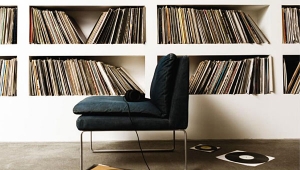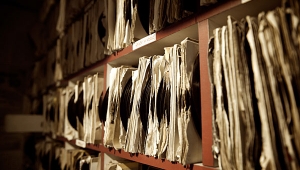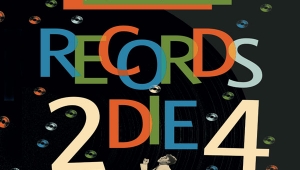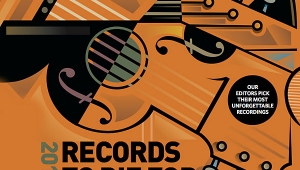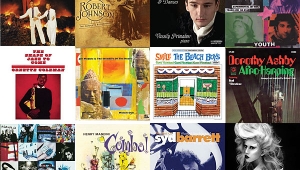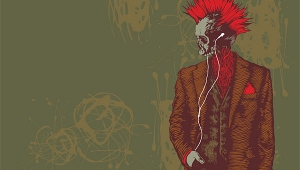| Columns Retired Columns & Blogs |
1996 Records To Die For Page 8
Lewis Lipnick
WILLIAM WALTON: Symphony 1, Cello Concerto
Robert Cohen, cello; Andrew Litton, Bournemouth Symphony
London 443 450-2 (CD only). Chris Hazell, prod.; Simon Eadon, Philip Siney, engs. DDD. TT: 73:57
Although Robert Cohen's performance of this undeservedly obscure cello concerto is superb, the real jewel here is Andrew Litton's electrifying interpretation of Walton's First Symphony. While there certainly are many other fine recordings of this masterpiece, none that I've heard has the refinement and energy created by Litton and the Bournemouth SO. This complex, thickly orchestrated score, all too often presented as a puddle of musical mud. In Litton's hands all of the instrumental lines and voice leadings are clearly evident, giving us a performance that finally does justice to this underrated composer's musical genius.
WEBER: Bassoon Concerto in F; Andante e Rondo Ungarese for Bassoon & Orchestra
HUMMEL: Bassoon Concerto in F
Klaus Thunemann, bassoon; Sir Neville Marriner, Academy of St. Martin-in-the-Fields
Philips 432 081-2 (CD). DDD. TT: 49:57
In the hands of Klaus Thunemann, the lowly bassoon, so often referred to as the clown of the orchestra, is elevated to the solo status more often enjoyed by the other woodwinds. Weber's Rondo Ungarese is more often heard as a solo for viola and orchestra, but I (a bassoonist) find this version to be more musically appropriate. Thunemann's superb technical control and gorgeous, resonant tone set a new standard for bassoon playing. Every time I hear this recording, I feel like giving up, throwing my bassoons into the fireplace, and selling mid-fi audio for a living.
Robert Levine
HANDEL: Messiah
Jennifer Vyvyan, soprano; Monica Sinclair, mezzo; Jon Vickers, tenor; Giorgio Tozzi, bass; Royal Philharmonic Orchestra and Chorus, Sir Thomas Beecham
RCA 61266-2 (3 CDs only). John Pfeiffer, reissue prod. ADD. TT: 2:41:18
Equally reviled and adored, Messiah as orchestrated by Sir Eugene Goossens and led by Beecham (actually, it has recently come to light that Beecham threw out Goossens' work and orchestrated it himself) is an amazing aural spectacle, and a superb performance as well. The orchestra is huge, with piccolos, harps, extra brass, and enough cymbals for the 1812 Overture; tempos are broad, the mood is one of dramatic awe, the singers and players are excellent. Definitely not for the McGegan/Hogwood/Gardiner crowd, but what a great experience!
MONTEVERDI: Vespro della Beata Vergine
Soloists; La Chappelle Royale Orchestra & Chorus, Collegium Vocale, Les Saqueboutiers de Toulouse; Philippe Herreweghe
Harmonia Mundi 901247.48 (2 CDs only). Pere Casulleras, eng. DDD. TT: 89:31
I own ten recordings of this great work, and this is the one to which I most frequently return. It's not the most dramatic (those are Corboz or Gardiner) or the loudest or most aggressive (that's Pickett), or the most transparent (that's Parrott). But it's the most beautiful, reverential, and, in a way, deeply felt of them all, and the soloists, choirs, and instrumentalists take back seats to none. The recording has a matte finish that adds to the piety; it's smooth as silk and balances are not tampered with. And Herreweghe's arrangement choices seem just right. Gorgeous!
Richard Lehnert
CALAMUS: The Splendour of al-Andalus
Arab-Andalusian Music of the 12th to the 15th centuries
Eduardo Paniagua, chabbada, flutes, salterio, târ, cymbals, voice; Luis Delgado, oud, citola, guimbri, doira, târ, handclaps, voice; Begoña Olavide, voice, quanun, salterio, caraqebs, târ, darûga; Rosa Olavide, voice, rabel, viola, portative organ, cymbals; Carlos Paniagua, darbûga, t'abila, pandero, campanillas, voice
M•A Recordings M026A (CD only). Todd Garfinkle, prod., eng. DDD. TT: 60:10
To order, fax M•A Recordings: (818) 783-4938.
This disc has everything: terrific playing and singing, timelessly evocative compositions eight centuries old, and some of the most lush, wet, fully rounded, you-are-there sound ever recorded, with a soundstage that goes on forever. This was a Recording of the Month back in May '95 (Vol.18 No.5), but that wasn't enough---it's a genuine Record To Die For. When Begoña Olavida's rich, plummy voice enters to sing the introduction of Mosaddar's "Ya Muslimin," filling the expansive acoustic of the Monasterio de la Santa Espina in Valladolid, Spain, you'll whisper "Amen" to the 13th-century words she sings, "Dios guarde al cantor" ("God, watch over the singer"), as you learn new meanings of the phrase "reverberant decay." This single-point recording is all the argument and justification minimalist miking will ever need. (XVIII-5)
WAGNER: Tristan und Isolde
Siegfried Jerusalem, Tristan; Waltraud Meier, Isolde; Matti Salminen, King Marke; Falk Struckmann, Kurwenal; Marjane Lipovsek, Brangäne; Johan Botha, Melot; others; Berliner State Opera Chorus, Berlin Philharmonic, Daniel Barenboim
Teldec 94568-2 (4 CDs only). Martin Sauer, prod.; Ulrich Ruscher, eng. DDD. TT: 3:55:38
It's the best kind of shock when a conductor can take a score one thought one knew intimately and reinvents it before one's very ears. Daniel Barenboim does just that here. No bar is taken for granted or left unexamined, no note left unexploited for maximum expressive content. Meier is slightly out of her depth here vocally, but you'll never hear a better-acted Isolde. And Jerusalem proves once and for all that Act III can actually be sung. This set is truly a revelation for this all-but-impossible work, and final proof (if any was needed after his triumphant Bayreuth Ring recordings) that Barenboim is the pree! minent Wagner conductor of the age. With sound that's effortlessly rich, full, and vivid, a no-brainer: buy it.
WILLIAM WALTON: Symphony 1, Cello Concerto
Robert Cohen, cello; Andrew Litton, Bournemouth Symphony
London 443 450-2 (CD only). Chris Hazell, prod.; Simon Eadon, Philip Siney, engs. DDD. TT: 73:57
Although Robert Cohen's performance of this undeservedly obscure cello concerto is superb, the real jewel here is Andrew Litton's electrifying interpretation of Walton's First Symphony. While there certainly are many other fine recordings of this masterpiece, none that I've heard has the refinement and energy created by Litton and the Bournemouth SO. This complex, thickly orchestrated score, all too often presented as a puddle of musical mud. In Litton's hands all of the instrumental lines and voice leadings are clearly evident, giving us a performance that finally does justice to this underrated composer's musical genius.
WEBER: Bassoon Concerto in F; Andante e Rondo Ungarese for Bassoon & Orchestra
HUMMEL: Bassoon Concerto in F
Klaus Thunemann, bassoon; Sir Neville Marriner, Academy of St. Martin-in-the-Fields
Philips 432 081-2 (CD). DDD. TT: 49:57
In the hands of Klaus Thunemann, the lowly bassoon, so often referred to as the clown of the orchestra, is elevated to the solo status more often enjoyed by the other woodwinds. Weber's Rondo Ungarese is more often heard as a solo for viola and orchestra, but I (a bassoonist) find this version to be more musically appropriate. Thunemann's superb technical control and gorgeous, resonant tone set a new standard for bassoon playing. Every time I hear this recording, I feel like giving up, throwing my bassoons into the fireplace, and selling mid-fi audio for a living.
Robert Levine
HANDEL: Messiah
Jennifer Vyvyan, soprano; Monica Sinclair, mezzo; Jon Vickers, tenor; Giorgio Tozzi, bass; Royal Philharmonic Orchestra and Chorus, Sir Thomas Beecham
RCA 61266-2 (3 CDs only). John Pfeiffer, reissue prod. ADD. TT: 2:41:18
Equally reviled and adored, Messiah as orchestrated by Sir Eugene Goossens and led by Beecham (actually, it has recently come to light that Beecham threw out Goossens' work and orchestrated it himself) is an amazing aural spectacle, and a superb performance as well. The orchestra is huge, with piccolos, harps, extra brass, and enough cymbals for the 1812 Overture; tempos are broad, the mood is one of dramatic awe, the singers and players are excellent. Definitely not for the McGegan/Hogwood/Gardiner crowd, but what a great experience!
MONTEVERDI: Vespro della Beata Vergine
Soloists; La Chappelle Royale Orchestra & Chorus, Collegium Vocale, Les Saqueboutiers de Toulouse; Philippe Herreweghe
Harmonia Mundi 901247.48 (2 CDs only). Pere Casulleras, eng. DDD. TT: 89:31
I own ten recordings of this great work, and this is the one to which I most frequently return. It's not the most dramatic (those are Corboz or Gardiner) or the loudest or most aggressive (that's Pickett), or the most transparent (that's Parrott). But it's the most beautiful, reverential, and, in a way, deeply felt of them all, and the soloists, choirs, and instrumentalists take back seats to none. The recording has a matte finish that adds to the piety; it's smooth as silk and balances are not tampered with. And Herreweghe's arrangement choices seem just right. Gorgeous!
Richard Lehnert
CALAMUS: The Splendour of al-Andalus
Arab-Andalusian Music of the 12th to the 15th centuries
Eduardo Paniagua, chabbada, flutes, salterio, târ, cymbals, voice; Luis Delgado, oud, citola, guimbri, doira, târ, handclaps, voice; Begoña Olavide, voice, quanun, salterio, caraqebs, târ, darûga; Rosa Olavide, voice, rabel, viola, portative organ, cymbals; Carlos Paniagua, darbûga, t'abila, pandero, campanillas, voice
M•A Recordings M026A (CD only). Todd Garfinkle, prod., eng. DDD. TT: 60:10
To order, fax M•A Recordings: (818) 783-4938.
This disc has everything: terrific playing and singing, timelessly evocative compositions eight centuries old, and some of the most lush, wet, fully rounded, you-are-there sound ever recorded, with a soundstage that goes on forever. This was a Recording of the Month back in May '95 (Vol.18 No.5), but that wasn't enough---it's a genuine Record To Die For. When Begoña Olavida's rich, plummy voice enters to sing the introduction of Mosaddar's "Ya Muslimin," filling the expansive acoustic of the Monasterio de la Santa Espina in Valladolid, Spain, you'll whisper "Amen" to the 13th-century words she sings, "Dios guarde al cantor" ("God, watch over the singer"), as you learn new meanings of the phrase "reverberant decay." This single-point recording is all the argument and justification minimalist miking will ever need. (XVIII-5)
WAGNER: Tristan und Isolde
Siegfried Jerusalem, Tristan; Waltraud Meier, Isolde; Matti Salminen, King Marke; Falk Struckmann, Kurwenal; Marjane Lipovsek, Brangäne; Johan Botha, Melot; others; Berliner State Opera Chorus, Berlin Philharmonic, Daniel Barenboim
Teldec 94568-2 (4 CDs only). Martin Sauer, prod.; Ulrich Ruscher, eng. DDD. TT: 3:55:38
It's the best kind of shock when a conductor can take a score one thought one knew intimately and reinvents it before one's very ears. Daniel Barenboim does just that here. No bar is taken for granted or left unexamined, no note left unexploited for maximum expressive content. Meier is slightly out of her depth here vocally, but you'll never hear a better-acted Isolde. And Jerusalem proves once and for all that Act III can actually be sung. This set is truly a revelation for this all-but-impossible work, and final proof (if any was needed after his triumphant Bayreuth Ring recordings) that Barenboim is the pree! minent Wagner conductor of the age. With sound that's effortlessly rich, full, and vivid, a no-brainer: buy it.
- Log in or register to post comments

